-
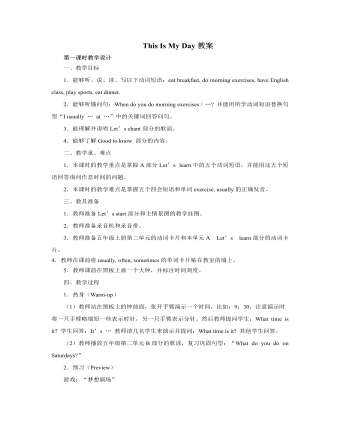
人教版新课标PEP小学英语五年级下册This Is My Day教案
学生初步了解对话内容,在描述中培养学生的语言运用能力。(2)教师让学生自己阅读本部分对话,不理解的生词和句子可以和同学或老师共同商讨。(3)教师帮助学生理解句子:“The weather report says it’s going to rain tomorrow. I can’t play football in the rain. I can’t go hiking, either. Let’s watch TV together.”出示图片:1) 晴天,Zoom在踢足球,图下显示:today;2)天在下雨,Zoom和Zip在屋里看电视,图下显示:tomorrow。与学生展开对话T:What’s the weather like today? S:It’s fine/ sunny. T:What does the weather report say about tomorrow?S:It’s going to rain.T:The weather report says it’s going to rain tomorrow.(呈现句子)(学生重复句子The weather report says it’s going to rain tomorrow.,并说出意思。)T:Can you play football in the rain?S:No,I can’t.T:Can you go hiking ?S:No,I can’t.T:In the rain, we can’t play football. We can’t go hiking, either. (呈现:either)学生跟读either,感悟单词的用法,教师讲解意思:(不......),也不...启发学生用either说两句话:In the rain, I can’t ... I can’t ..., either,从而在应用中巩固单词的读音和用法。
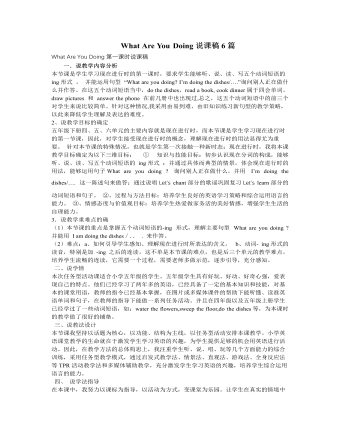
人教版新课标PEP小学英语五年级下册What Are You Doing说课稿6篇
五、教学程序:下面我结合课件谈谈本节课的教学程序: 1. 课前热身:让同学们边说边做动作。这段Chant联系了两个内容,一是现在进行时,二是We’re having a party. We are happy. 这两点都紧扣本课的两个要点。2. Revision: Are you happy? Let’s do something happy and funny. Let’s play a game. What are you doing? I’m cooking, cooking. 全班分为四组,每组代表轮流提问:what are you doing ,下一组任何一位同学快速回答I’m cooking, cooking.并做相应动作。这一游戏不只复习了大量的动词和进行时,也让同学逐渐在竞赛中趋向兴奋的状态。3. Presentation: I’m happy today, Do you know why? Because it’s my birthday today.把同学的注意力引到我的身上。Look at me. What am I wearing today? I’m wearing a skirt. I am wearing a sweater.引出今天要掌握的单词wear与句型I’m wearing…,然后提问What are you wearing? What is he /she wearing? 同学刚开始回答时可能会用I am in …..?但回答过几轮之后他们就能够正确运用Wear这个词了。

人教版新课标PEP小学英语五年级下册This Is My Day说课稿4篇
六, 说教学难点1. 培养学生合作学习的能力.,同时注意培养学生学习英语的兴趣, 树立自信心.2,单词mountain引导学生分音节模仿读音,掌握拼写,强调字母组合ou 发( ),ai发( ).将单词grandparents分为grant和parents让学生掌握3,在小组讨论的前提下,在学生挖掘已有的知识点和新的词组七, 说教学准备Let's learn ,let's sing 和Let's chant的录音磁带.以及卡片go to bed get up have dinner eat breakfast play sports do morning exercises .以及短语卡片 climb mountains go shopping play the piano visit grandparents go hiking 以及卡纸八,说教法,学法为了突破这堂课的重,难点,根据小学五年级学生好奇,好胜,内敛,爱面子,表现欲旺盛等生理和心理特点,我主要采取了以任务型教学模式为主,以活动,合作为主线,让学生在教师的指导下,通过感知,体验,实践,参与和合作,游戏感悟等多法并用的方式组织教学.彻底改变传统的"讲授"的教学模式,促进语言实际运用能力的提高.
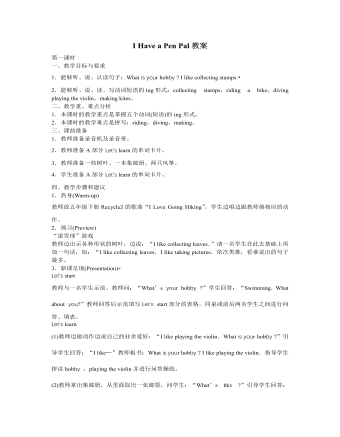
人教版新课标PEP小学英语六年级上册I Have a Pen Pal教案
(1)教师说:“Zhang Peng’s mother is a teacher.What does she teach? Does she teach English?”教师出示Let’s talk部分的挂图,放录音,学生听录音阅读对话。教师出示主句型:Does he/she…?Yes,he/she does.No,he/she doesn’t.然后教师引导学生回答刚刚提出的问题,逐步掌握肯定和否定回答。再放一遍, 学生跟读. (2)教师说:“My mother is a teacher,too.Do you want to know more about her.Ask me some questions.”教师依次出示B Let’s learn部分的单词卡片,提示学生根据上面的短语和黑板上的重点句型提问,教师作答。 (3)教师指导学生进行替换练习。必要时,提示学生可以换一下对话里的人物,f 如:Does your uncle live in the city? Yes,he does.Does your grandma live in the country? No,she doesn’t. (4)“寻找家园”游戏 教师准备一些卡片,正面写有人名,反面写有地名,如:city,country,village,farm,forest,mountain,nature park等。请一名学生上台抽取一张卡片,问台一学生:“Guess.Where does…live?’’学生猜:“Does he/she live in/on…?”猜对的小组得一分。
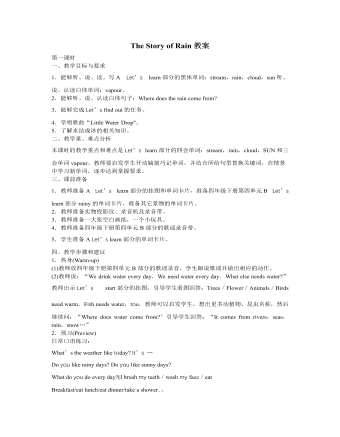
人教版新课标PEP小学英语六年级上册The Story of Rain教案
(2)教师说:“I am going to plant a flower on the weekend.But I don’t know hoⅥ do that.Can you tell me? Who knows?”教师提示学生可以适当用中文解释。如果有学生举手,教师就问:“OK.How d0 you do that?”引导学生回答。“First,put the seeds in the soil.”然后,教师接着说:“What should I do then? 引导学生回答“Water it. (3)教师说:“Zhang Peng is talking to h is teacher.Now Let’s see what they talking about.”学生翻开学生用书,教师放录音,学生跟读。教师解释In several days的意思是几天以后。”教师板书四会句型:How do you do that? What should you do then?学生仿写。 (4)同桌学生进行对话替换操练,可以谈论西瓜(watermelon)、小麦(wheat)等植物的种植过程。然后选几组在班上表演对话。 (5)教师指导学生运用主句型编对话。以下对话供参考: A:How do you clean the classroom? B:First.sweep the floor. A:What should you do after that? B:Then clean the desks and chairs.wash the windows. 4.巩固和延伸(Consolidation and extension) (1)做本单元B Let’s talk部分的活动手册配套练习。
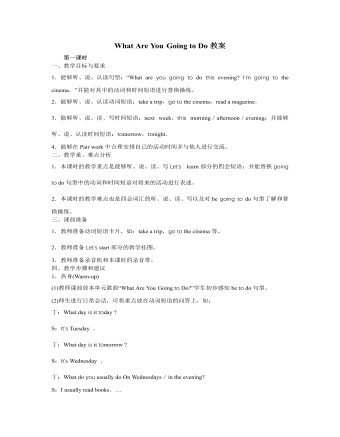
人教版新课标PEP小学英语六年级上册What Are You Going to Do教案
1.热身(Warm-up) (1)全班一起吟唱Let’s chant的歌谣。 (2)单词拼写竞赛 要拼写的单词包括:this morning/afternoon/evening,next week,newspaper, postcard等。可采取小组合作的“接龙式”拼写形式;也可以选取组内一名学生拼写全部单词。拼出单词最快最多的组获胜。 (3)教师出示简明地图,师生问答如下: r:What shop is it? s:It’s a bookstore. r:What can you buy in the bookstore? s:… 在学生回答各商店所出售的物品时,教师根据其回答贴出物品的小卡片,如: Fruit stand:orange,apple,pear,banana….Shoe store:sneakers,sandals,boots….(此时可引导学生说“a pair of sneakers/boots’’等) 2.预习(Preview) Let’s try 教师指着地图中的商店及各商店所出售的物品说:Look!There are so many stores and so many goods.Let’s listen to the tape and find out:①Where is Sarah going? ②What is she going to buy? ③Who is she going with? 教师放三遍Let’s try部分的录音,以上问题可根据学生的实际情况分三次提出,直到多数学生能回答并能将前两项答案填人教师课前画出的表格中。在填表过程中,教师请学生一起拼写其中的四会单词,如:bookstore,comic book。
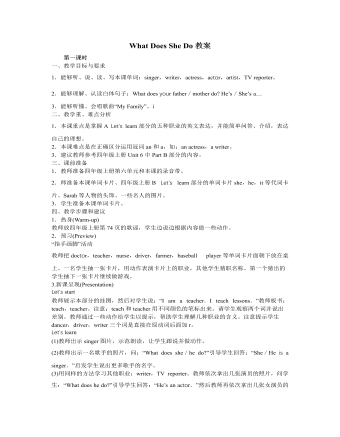
人教版新课标PEP小学英语六年级上册What Does She Do教案
(3)教师就黑板上的内容和学生做对话练习,如:What does your mother do?Where does she work?How does she go to work?教师板书“Where does she work?”和“How does she go to work?”,示范朗读,学生跟说。学生两人一组根据黑板上的语言提示做对话练习。 (4)“看卡片,说句子”活动 教师面前放一摞单词卡片,依次为:职业名称卡片,工作地点卡片和交通方式卡片。活动开始,教师随意从第一摞卡片中抽取一张职业卡片,如:engineer,举起来问:“What does your father do?”学生回答“He’s an engineer.”教师继续抽取一张工作地点卡片,举起来,如:Car company,问:“Where does he work?”学生说:“He works in a Car company.”教师再抽取一张交通方式卡片,如:bus,问:“How does he go to work?学生回答:“He go es to work by bus.”游戏进行几轮后,可以请几名学生轮流代替教师抽卡片,提问题。 (5)教师放本部分的录音,学生跟读。学生两人一组读课文对话。 (6)学生两人一组做对话替换练习。 (7)教师指导学生书写四会句子。 4.巩固和延伸(Consolidation and ex tension) Group work
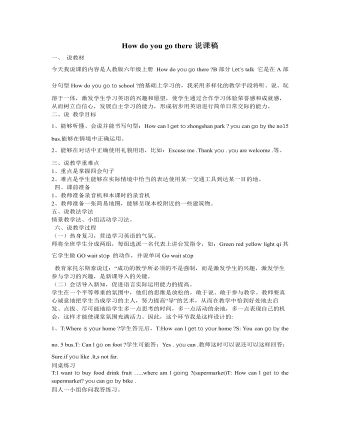
人教版新课标PEP小学英语六年级上册How do you go there说课稿
一、 说教材今天我说课的内容是人教版六年级上册 How do you go there ?B部分Let’s talk 它是在A部分句型How do you go to school ?的基础上学习的,我采用多样化的教学手段将听、说、玩溶于一体,激发学生学习英语的兴趣和愿望,使学生通过合作学习体验荣誉感和成就感,从而树立自信心,发展自主学习的能力,形成初步用英语进行简单日常交际的能力。二、说 教学目标1、能够听懂、会说并能书写句型:How can l get to zhongshan park ? you can go by the no15 bus.能够在情境中正确运用。2、能够在对话中正确使用礼貌用语,比如:Excuse me .Thank you . you are welcome .等。三、说教学重难点 1、重点是掌握四会句子2、难点是学生能够在实际情境中恰当的表达使用某一交通工具到达某一目的地。 四、课前准备 1、教师准备录音机和本课时的录音机2、教师准备一张简易地图,能够呈现本校附近的一些建筑物。
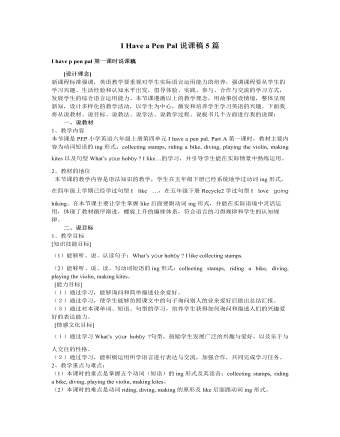
人教版新课标PEP小学英语六年级上册I Have a Pen Pal说课稿5篇
一、说教学思想我在本课教学设计中坚持以人文科技教育为中心,以学生为主体;以兴趣为支点、以交流为目的、以活动任务为途径的教学原则。通过最新的计算机多媒体等教学手段创造贴近生活的教学情境,并在课堂上大量地采用互动式教学模式(包括人机互动),使学生自然进入英语世界;在教学过程中,综合运用情景教学、任务型教学、交际教学、整体语言教学等手段,全面培养学生的听、说、读、写等语言综合运用能力。在课内、课外全面利用网络技术,如在线英语学习、博客(Blog)、魔灯(Moodle)、QQ群、论坛(BBS)等手段,做到英语与信息技术的完美整合。二、说教材与教材处理本课采用的教材是是人教版小学英语(PEP)六年级上册,内容为学生学完I Have a Pen Pal后的一节综合实践活动(复习)课。本单元教学重点为E-mail和英语书信的写法。通过该单元的学习,学生基本了解一些英语书信书写的方法。但是学生还没有利用计算机网络去写英文E-mail(包括写E-mail内容和写E-mail地址。)
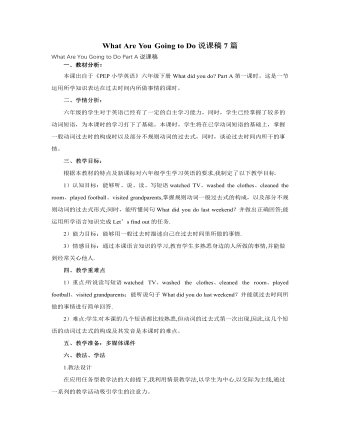
人教版新课标PEP小学英语六年级上册What Are You Going to Do说课稿7篇
四.说教学方法 “任务型”教学方法. 在本课的教学中,学生要完成购买书籍这样一个任务.这给学生创造了一个真实的语境去运用所学的句子进行交际.教师安排了4个活动:单词操练游戏、小组竞赛、小组活动和购物. 五.说教学准备 (一)教师准备:1.单词卡片。2.课件。3.各种书籍。 (二)学生准备:各种书籍. 六.说学习策略 在本节课上,学生可以通过多种方法来学习并记忆单词,如跟读、拼读、分音节、读看实物说单词、听单词拿实物等等.小组竞赛能激发学生的学习热情,鼓励学生表现自己. 七.说教学过程 一.复习和热身(Warm up) 1.唱英语歌曲. 2.朗读“口语天天练”的句子. 3.日常对话. 二.呈现新课(Presentation) 1.播放课件,呈现单词.学生跟读单词. 2.学习新单词. (1)教师带读单词,学生跟读. (2)拼读单词. (3)学生熟读单词.
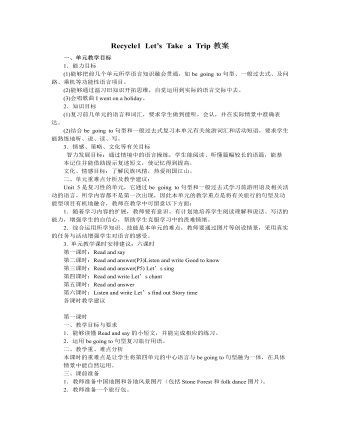
人教版新课标PEP小学英语六年级下册Recycle1 Let’s Take a Trip教案
4.巩固和扩展(Consolidation and extension) (1) 做本单元活动手册配套练习。 (2) 翻卡片说单词。学生两人一组,把单词卡片反面朝上放在桌子上,然后同时翻开两张单词卡(如:going, holiday),就马上组织成一句话(如:Where are you going on the holiday?/ I’m going to Kunming this holiday.),说得快又正确者为胜。 (3) 教师播放C部分Story time的录音或VCD,帮助学生理解故事内容。学生再听一遍录音,跟读故事里的句子,教师指导学生发音。 (4) Bright eyes. 在黑板上张贴Let’s find out的8幅图片,Mike, Zhang Peng, Sarah, Kathy等4个人物图片分别放在8幅图片上,如:Mike ---take pictures---buy presents。学生仔细观察后,请学生闭上眼睛,教师就趁学生闭眼之际交换人物位置(如把Mike放到eat noodles),然后请学生张开眼睛回答:What did Mike do just now ? 引导学生回答: Mike took pictures and bought presents. 教学参考资料库 1.文化背景介绍: 机场标志: Airport 飞机场 Airport lounges 机场休息室Airports shuttle 机场班车 Arrivals 进港Assistance 问讯处Check in area (zone) 办理登机区Departure airport 离港时间Departure times on reverse 返航时间 Welcome aboard 欢迎登机
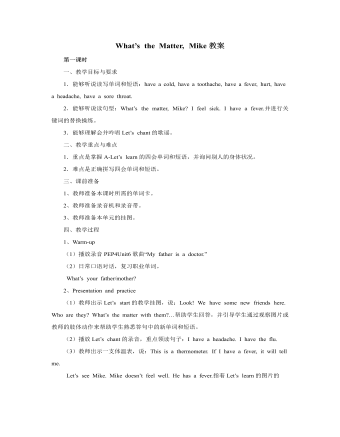
人教版新课标PEP小学英语六年级下册What’s the Matter, Mike教案
回答:She’s sad. She failed the math test.并板书:fail the math test。准备一张很糟的数学试卷,是学生了解语意。进一步教学其他短语a Chinese test, a English test,并 让学生了解pass the Chinese test, pass the English test, pass the math test. (4)教师请学生扮演Sarah,师生对话如下: T: Hello! Sarah, how are you? You look sad today. Sarah: Yes, I failed the math test. 教师接着说:I’m sorry to hear that.让学生理解意思。并引申出句子:I’m glad to hear that.让学生分角色朗读对话。 (5)Let’s check.让学生看Sarah的表情,并读两篇对话,选出正确的答案。 (6)活动名称:心理医生 活动目的:操练句型“How are you? You look…”.学生间自由组合编排对话.通过对话对学生展开情感教学,让学生理解健康的体魄和愉悦的心情的心情是一个人成功的重要因素,使学生形成良好的心理健康状态。 活动过程:A: How are you? You look bored today. B: Yes. I failed my math test. A: I’m sorry to hear that. Believe yourself. Work hard. You can pass the text next time. (7)活动名称:难忘时刻 活动目的:围绕照片上的表情展开询问和讨论.操练句型 “How do you feel? How does she/he feel?
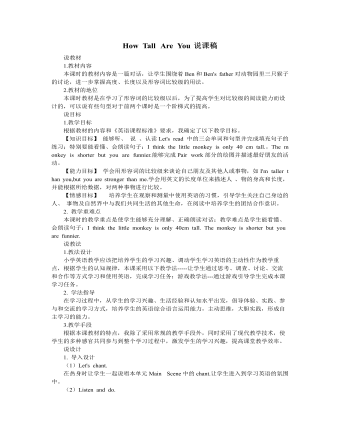
人教版新课标PEP小学英语六年级下册How Tall Are You说课稿
【设计思路】阅读最主要的目的是让学生看懂短文主要内容,通过上述判断题,可了解学生的掌握程度。(5)完成课文中的填空并校对。(6)学生听录音跟读,模仿录音中的语音语调。3.操练巩固请学生合作表演课文中的对话,课件出示情景和提示。这里也可进行分层次教学:有些学生擅长表演但语音语调在这节课上还没完全掌握,这里就可以请那些擅长表演的学生脱开课文表演,一部分学生可以与他人合作进行配音。【设计思路】 采用这个方式,可以照顾到程度不同的学生,参与面更广。本课时的阅读材料是动物间的比较,接下来我们要进行人物间的比较,让学生能更好地运用比较词和人称代词。这里可以采用游戏法和交际法。教师在屏幕上依次出现下列几组学生熟悉的人物:小丸子和蜡笔小新:王楠和张怡宁:贝克汉姆和欧文:樱木花道和流川枫。首先可以让学生猜一猜How old is he/she? How tall is he/she?Who is stronger/taller?Who is older/younger?等。

人教版新课标PEP小学英语六年级下册Last Weekend说课稿9篇
一、教学内容分析1. 教学内容介绍:.本课是一节复习课,复习内容为Last Weekend A B 两部分。教学主要是10个词组和2个句型,并结合六年级学生即将毕业,在原有教材的基础上融入了大量有关周末活动的句型和短语。使学生在“周末活动”这一话题下,尽可能多地滚动复习更多相关的动词短语。本课要掌握的短语和句子有Words and phrases: watched TV; washed clothes; cleaned the room; played football; visited grandparents; read a book; went to a park; went swimming; went hiking; went fishing;Key sentences: What did you do last weekend? I played football; Did you read books? Yes, I did. No, I didn’t.2. 知识的前后联系:Last weekend的话题是周末活动,关于日常活动的话题已在小学课本中多次出现,例如在B4U2; B5U2; B5U4; B6U1; B6U5; B7U3;B8U3中7次出现。在进行U3 last weekend的复习中,对周末活动的内容要进行深化。除了要求学生能够“四会”掌握本单元的词汇外,还应注意培养学生听、说、读、写的能力,让学生在一定的情景中在句中运用单词,在篇章中运用句子,赋予单词、句子特定的意义,而不是孤立地学习单词和句子,使学生一看到这些单词就能在一定的情景下使用,进而组合这些句子形成篇章,从而培养学生综合运用语言的能力。
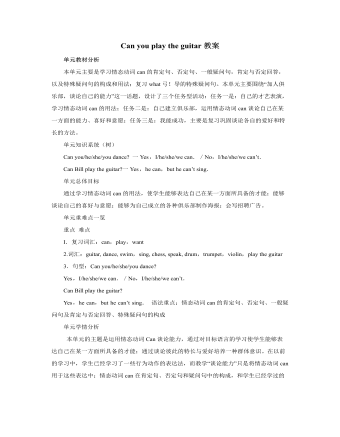
人教版新目标初中英语七年级上册Can you play the guitar教案
本单元主要是学习情态动词can的肯定句、否定句、一般疑问句,肯定与否定回答,以及特殊疑问句的构成和用法;复习what弓!导的特殊疑问句。本单元主要围绕“加人俱乐部,谈论自己的能力”这一话题,设计了三个任务型活动:任务一是:自己的才艺表演,学习情态动词can的用法;任务二是:自己建立俱乐部,运用情态动词can谈论自己在某一方面的能力、喜好和意愿;任务三是:我能成功,主要是复习巩固谈论各自的爱好和特长的方法。单元知识系统(树)Can you/he/she/you dance? 一Yes,I/he/she/we can./No,I/he/she/we can’t.Can Bill play the guitar?一Yes,he can,but he can’t sing.单元总体目标通过学习情态动词can的用法,使学生能够表达自己在某一方面所具备的才能;能够谈论自己的喜好与意愿;能够为自己成立的各种俱乐部制作海报;会写招聘广告。单元重难点一览重点 难点I.复习词汇:can,play,want2.词汇:guitar, dance, swim,sing, chess, speak, drum,trumpet,violin,play the guitar3.句型:Can you/he/she/you dance?Yes,I/he/she/we can./No,I/he/she/we can’t.Can Bill play the guitar?

人教版新目标初中英语七年级上册Do you have a soccer ball教案
在这一单元中,学生要学会就有关人与物之间所属关系进行问答的句子。本单元大量引入有关运动的名词,要求学生彼此询问有无此类物品,并做出相应的回答。 同时学习表示建议的句型Let’s运动的形容词。 本单元所选用的话题来自学生所喜欢的生活片段,在教学中生生交流、师生交流会更融洽,会促进师生彼此间的了解,成功的教学还会让部分学生养成良好的运动习惯和收藏习惯。 教学目标 1) 语言知识:A.在询问对方是否有某物的对话中学会使用do和does引导的一般疑问句; B. 学会使用描述性的形容词来评价事物; C. 学会在对话中使用名词复数; D. 学会用祈使句来向对方提出建议. 2) 语言技能:A. 学会用祈使句询问某人是否有某物; B. 学会向他人提出建议的句子. 3) 学习策略:A.通过与同学讨论,做出猜测;

人教版新课标PEP小学英语六年级下册My Holiday说课稿5篇
本课时是本单元的第二课时,属对话课,它是对第一课时词汇课学习的一种巩固和延伸,同时也是下一课时阅读课的铺垫,因此起着承前启后的作用。二、学情分析通过三年多的英语学习,大部分学生已具备了一定的英语学习能力,他们能够听懂有关熟悉话题的语段,能与教师或同学就熟悉的话题交换信息,能读懂简短的的语篇。对于本文中的重点语法项目一般过去时,属于上一单元已学内容,本单元旨在继续巩固其用法,所以学生对该内容不是很陌生。三、教学方法及手段1.教学方法小学英语教学应该把培养学生的学习兴趣、调动学生学习英语的主动性作为教学重点,根据学生的认知规律,本课在应用任务型教学法的大前提下,利用情景教学法以及TPR教学法相结合,以学生为中心,以交际为主线,通过一系列的教学活动吸引学生的注意力,努力让学生积极参与,学以致用,并在用的过程中发展语言能力、思维能力以及交流合作的能力。
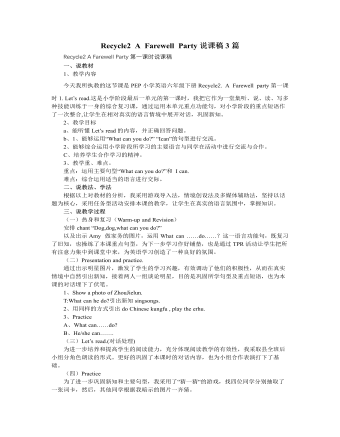
人教版新课标PEP小学英语六年级下册Recycle2 A Farewell Party说课稿3篇
教学目标:(1)知识目标:1.能够听、说、认读句子:Let's read, Let's make ,listen,write,match and say 中的句子。2.能够听懂 Listen and write 部分的录音并正确填写句子。(2)能力目标:通过教学,使学生能够了解英语请柬的内容并会模仿书写英语请柬。(3)情感目标:培养师生之间和同学之间的友谊与情感,积极鼓励学生展现才能。三、说教学重点:1.能够听、说、认读句子:"We're going to have a farewell party . How do you feel? I feel …."四、说教学难点:Is every having a good time?五、说教法:1. 教法设计本节课中,在教学过程中注意发挥学生的主动积极性,给学生一个轻松愉快的语言学习氛围,让学习过程充满乐趣,同时使他们感受到一定的挑战,满足他们的成就感,使思维始终处于积极状态。2. 学法指导重视多元智能教学原理、合作学习法和任务型语言学习法等应用,充分调动学生的感觉器官,想象能力,激发学生积极参与课堂教学活动。

人教版新目标初中英语七年级上册Do you want to go to a movie教案
讨论喜欢的影视类型及理由:在看过一部影视作品后,大家总是喜欢在一起谈论影视的主要内容、主要情节、主要演员主题歌曲、主题音乐等,互相介绍自己对该影视的看法。教师可以组织一次活动,分组讨论学生喜欢看什么类型的电影,并说明喜欢的理由。运用I like…I don’t like…Because it is…等语言结构;然后每个组选派一名代表向全班学生阐述本组组员喜欢观看的电影类型;最后汇总,总结出全班同学最喜欢观看哪一种类型的电影。如果有可能,根据学生的选择放一部(一段)这种类型的影视节目。通过学生的讨论、调查,使他们在完成任务的过程中学会询问和陈述自己或别人在影视方面的喜好及理由,更好地巩固所学内容。Self Check教学内容Self Check(教材P58)教学目标知识与能力复习词汇go,movie,action,comedy,documentary,thriller,and,but,scary,funny, sad,exciting;引导学生复习、巩固“制订计划和打算并谈论喜好和偏爱”的目标语言。
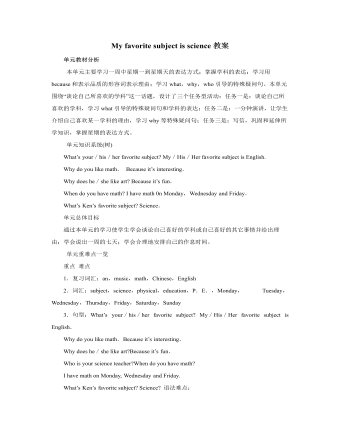
人教版新目标初中英语七年级上册My favorite subject is science教案
本单元主要学习一周中星期一到星期天的表达方式;掌握学科的表达;学习用because和表示品质的形容词表示理由;学习what,why,who引导的特殊疑问句。本单元围绕“谈论自己所喜欢的学科”这一话题,设计了三个任务型活动:任务一是:谈论自己所喜欢的学科,学习what引导的特殊疑问句和学科的表达;任务二是:一分钟演讲,让学生介绍自己喜欢某一学科的理由,学习why等特殊疑问句;任务三是:写信,巩固和延伸所学知识,掌握星期的表达方式。单元知识系统(树)What’s your/his/her favorite subject? My/His/Her favorite subject is English.Why do you like math. Because it’s interesting.Why does he/she like art? Because it’s fun.When do you have math? I have math 0n Monday,Wednesday and Friday.What’s Ken’s favorite subject? Science.单元总体目标通过本单元的学习使学生学会谈论自己喜好的学科或自己喜好的其它事情并给出理由;学会说出一周的七天;学会合理地安排自己的作息时间。